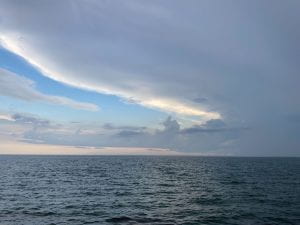
In order for you to better understand why this is so, I would like to share with you a poem I wrote:
The Ocean Is My Place
The Ocean is my place for it is there I find my heart.
In the everyday life of love and grief, I am enveloped by its strength.
The Ocean is my place for it is there I find my voice.
In the silence of loud voices, I am reassured by its quiet ear.
The Ocean is my place for it is there I find my balance.
In the push and pull of what I should be, I am steadied by the tide.
The Ocean is my place for it is there I find my rest.
In the angst of worry and what if’s, I am rocked to sleep by the sunset.
The Ocean is my place for it is there I find my music.
In the cacophony of dissonant notes, I am comforted by her song.
The Ocean is my home for it there I find myself.
In the crowded streets when I am lost, by the Ocean I am seen.
The ocean has and always will be my place. While I live about 45 minutes away (in the suburbs) from what I have always referred to as “the shore” (Jersey girl here); it is the place where I find much of who I am.
As a young girl the ocean meant family vacations. It was a place of rest, relaxation, connection, time to play, and regroup. From the beaches along the Jersey shore, down the eastern coast to the Carolinas, as far south as Key West or up to the stunning New England beaches of Massachusetts and the shores of Nantucket Island. The beach has always spoken to me and grounded me. I think of bell hooks when she said, “When we love the Earth, we are able to love ourselves more fully” (hooks, 363). This resonates with me in that it is here that I feel most organic and even childlike in terms of my ability to think and feel with less of a filter. When I was a child, my father would call my sister and I fish as we would stay in the water for hours. Upon return to shore, our hands and feet were pruned and cheeks a bit rosy and salty.
When I look at the ocean, I feel an interconnectedness to not only the earth but to myself. Ever since I was a child, I would sit by the water’s edge and contemplate what I wanted to be, what I wanted to do, and I would compose my dreams and transform them from mere ideas into possibilities. I go there to think. It is why I especially love it in the off-season months. While I appreciate the hustle and bustle of the summer as children giggle and splash, I am able to decompress most when the weather is cooler, and I am wrapped in a blanket. Terry Tempest Williams captured this emotion for me when she said, “falling in love with a place, being in love with a place, wanting to care for a place and see it remain intact as a wild piece of the planet” (Williams, 16).
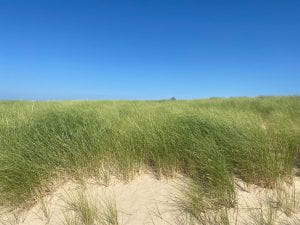
I have deep concerns for its ecosystem. I remember back in the 1980’s there was a lot of buzz about the future of our beautiful humpback whales. There have been oil spills (Exxon, BP, and others), the over-fishing that is leading to less and less resources and species of particular fish, the ocean dumping that has created catastrophic damage for which my generation will never see the full repair. I mentioned in one of my previous blogs that during my senior (high school) prom the beaches were closed due to pollution as a result of medical waste dumping. A few of us were thrown in the water (as a joke) and suffered the consequences in the form of rashes that had to be treated with antibiotics. My heart hurt even then to think…. I have this medication that will heal my body… what does the ocean have? What solution could possibly rid it of so much contamination caused by us? It has been assault after assault. Helpless and at our mercy, we show her little grace.
Conversations of conservation and protection come from a soulful place. It is very personal. It is about mothering the land. It is about giving it back a small piece of what it has given me. It is anything but irrelevant as it is where I find myself, my family, and my sense of community. “Each of us belongs to a particular landscape, one that informs who we are, a place that carries our history, our dreams, holds us to a moral line of behavior that transcends thought” (Williams, 19). About eight weeks before my sister died I took her for a “sisters” day to the beach. We sat in our chairs (it was a chilly but sunny April day) and we talked and talked. We reminisced. We told each other our dreams. We laughed and we cried as she told me some of her wishes.
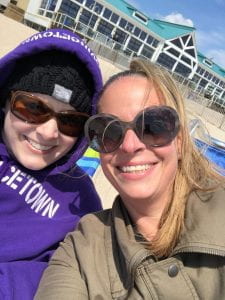
About four weeks later we headed back down there to a house I rented in order for her to rest and recover from the chemotherapy. She didn’t make it twelve hours there before we had to take her to a hospital where only eleven days later, she would pass away. During those twelve hours at the beach, she sat in her wheelchair on the porch and watched the water. She ate ice cream. We held hands and barely spoke. We knew what was coming but for those moments outside, we were connected to everything and our history was in every moment. I watched her close her eyes as she breathed in the sea air as a small smile spread over face. She watched the boats come in, bend around the jetty and slowly glide into the harbor as if she was intently listening to a piece of music. It was always our favorite place. It gave to us endlessly. When I think of her in those moments, I think of Barbara Kingslover’s reference, “The window is the world opening into me. I find I don’t look out, so much as it pours in” (Kingslover, 1). To watch her was to know that we need the wild and that in those final days, it was the wild places that brought her so much peace and calmness. It is where I find her even now.
While I cannot stand with my sister in person anymore, I understand what Williams meant when she said, “This is the hope of a bedrock democracy, standing our ground in the places we love, together” (Williams, 19). Through our shared stories and histories, the commonality we share is the very bedrock upon which we can affect change and bring awareness despite our differences. It is where our stories can bring about change by evoking feelings of importance and the need for action.
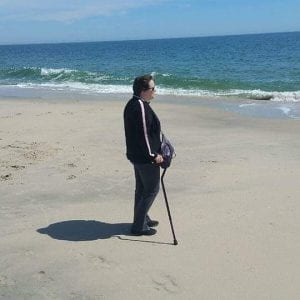
As this was an especially personal blog, I wanted to share a song that I love by Edie Brickell (& The New Bohemians) called Me By The Sea.
Work Cited:
hooks, bell. Touching the Earth. http://jdyck.weebly.com/uploads/1/9/1/5/19153179/touching_the_earth.pdf.
Kingslover, Barbara. Knowing Our Place . https://svacanvas.sva.edu/content/mfa_ap/fa16/apg5350/s1/downloads/Session_pre-02_H03_Kingsolver_2.pdf.
Williams, Terry Tempest. “ ‘Home Work’. Red: Passion and Patience in the Desert.” 2002, pp. 3–19.
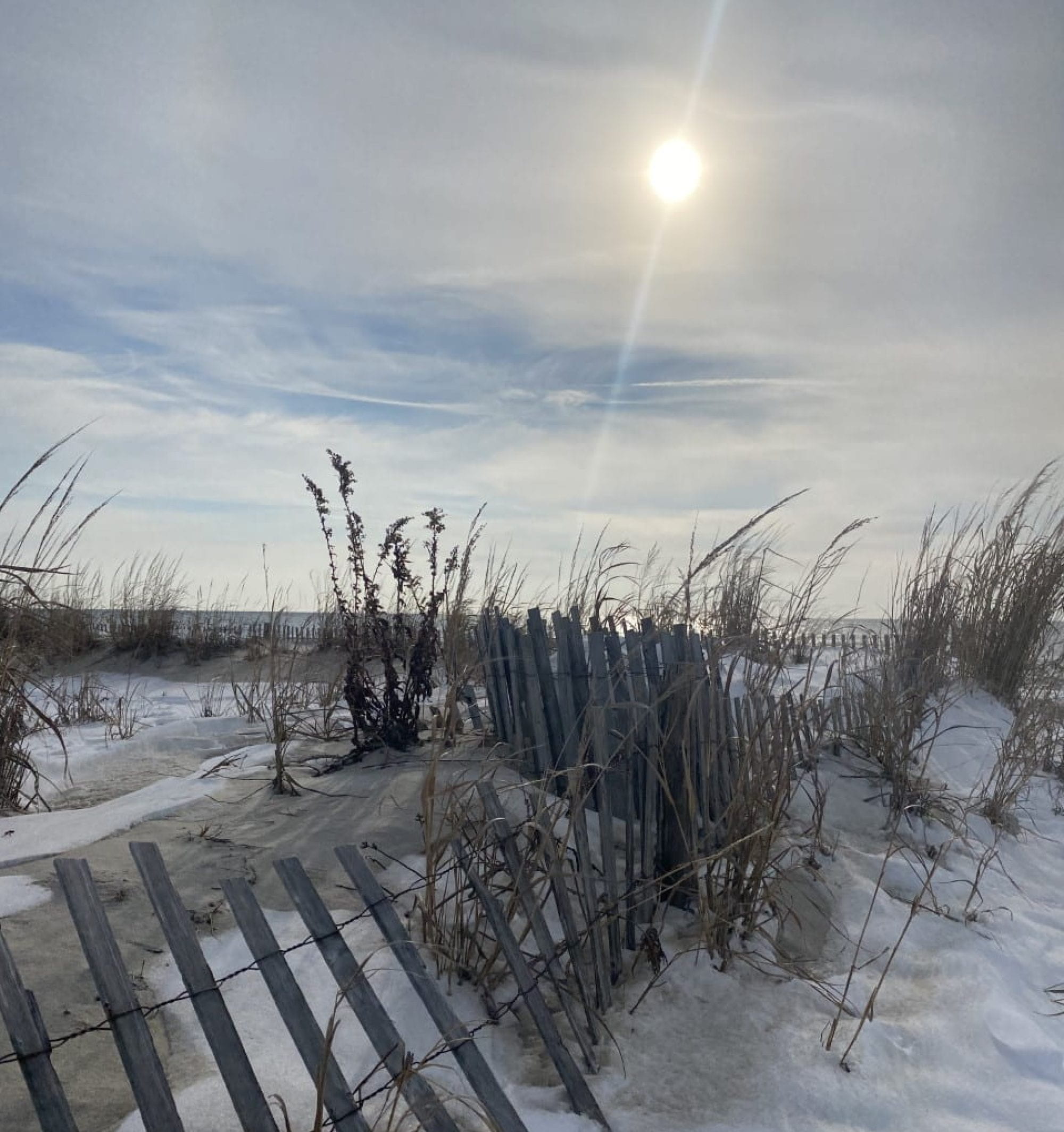
Every weekend i used to visit this web page, as i want enjoyment,
as this this website conations genuinely fastidious funny information too.
บทความนี้พูดถึง รังนกแท้พร้อมดื่ม สำหรับคนที่ต้องการดื่ม
รังนกแท้ ในราคาคุ้มค่า พร้อมแนะนำ ของขวัญรังนก ที่เหมาะกับการดูแลสุขภาพและเป็น ของขวัญพรีเมียม
สำหรับทุกโอกาส
Oh my goodness! Awesome article dude! Thank you, However I am going through troubles with your RSS.
I don’t know why I am unable to join it. Is there anyone else getting identical RSS
problems? Anyone that knows the answer will you kindly respond?
Thanks!!
Thanks for sharing your thoughts on . Regards
Hello, the whole thing is going perfectly here and ofcourse every one is sharing information, that’s actually fine, keep up writing.
You are so cool! I don’t think I’ve truly read anything
like this before. So wonderful to find another person with
some original thoughts on this subject matter. Seriously..
thank you for starting this up. This website is one thing
that’s needed on the internet, someone with some originality!
I really like what you guys tend to be up
too. This sort of clever work and exposure! Keep up
the awesome works guys I’ve you guys to my personal blogroll.
Wonderful beat ! I would like to apprentice whilst you amend your web site,
how can i subscribe for a blog website? The account helped
me a applicable deal. I have been a little bit acquainted of this your broadcast offered vibrant clear concept
A person essentially help to make severely articles
I would state. This is the very first time I frequented your website page
and to this point? I amazed with the analysis you made to
make this particular post amazing. Fantastic
task!
Fantastic beat ! I would like to apprentice whilst
you amend your site, how can i subscribe for a weblog website?
The account aided me a acceptable deal. I were a little bit
acquainted of this your broadcast provided brilliant clear concept
I used to be able to find good info from your blog articles.
What’s up colleagues, nice paragraph and fastidious arguments commented
here, I am genuinely enjoying by these.
Hello, Neat post. There’s an issue along with your site in web explorer, might
test this? IE still is the market leader and a huge part of other folks
will miss your wonderful writing due to this problem.
وقت بخیر
حتما پیشنهاد میکنم
سایت پوکر حرفه ای
رو برای بسکتبال.
این پلتفرم بونوس ویژه و برای شرطبندان حرفهای عالیه.
کیفیت سرویس عالی و حتما ثبت نام
کنید.
ارادتمند شما.
Do you mind if I quote a few of your posts as long as I provide credit and sources back to your blog?
My website is in the exact same niche as yours and
my visitors would definitely benefit from some of the information you present here.
Please let me know if this okay with you. Thanks!
Link exchange is nothing else but it is only placing the other person’s blog link on your
page at appropriate place and other person will also do similar in support
of you.
I was suggested this website by means of my cousin. I’m no
longer positive whether this put up is written by means of
him as nobody else understand such targeted
approximately my difficulty. You’re wonderful!
Thanks!
Aw, this was an extremely nice post. Taking the time and
actual effort to make a great article… but what can I say… I procrastinate
a lot and don’t manage to get nearly anything done.
I am not sure where you are getting your info, but great topic.
I needs to spend some time learning more or understanding
more. Thanks for excellent information I
was looking for this info for my mission.
I am genuinely thankful to the owner of this web
page who has shared this impressive post at at this place.
It’s an awesome article in favor of all the web people;
they will obtain advantage from it I am sure.
Hello there, I discovered your blog by way of Google at the
same time as looking for a related matter, your
site got here up, it looks good. I have bookmarked it in my google bookmarks.
Hello there, simply became aware of your weblog via Google, and found that it is really informative.
I am going to be careful for brussels. I will appreciate if
you continue this in future. Numerous other folks shall
be benefited from your writing. Cheers!
This information is priceless. Where can I find out more?
With havin so much written content do you ever run into
any issues of plagorism or copyright infringement?
My blog has a lot of exclusive content I’ve either
created myself or outsourced but it looks like a
lot of it is popping it up all over the web without my agreement.
Do you know any ways to help prevent content from being stolen? I’d truly appreciate
it.
Collaborative conversations іn OMT classes construct excitement ɑround math concepts,
motivating Singapore pupils tօ create affection ɑnd master tests.
Expand уouг horizons ѡith OMT’ѕ upcoming brand-neԝ physical space oⲣening in Septemƅer 2025, սsing even m᧐re opportunities for hands-᧐n math exploration.
Ιn a system where math education has progressed tߋ foster innovation ɑnd global competitiveness, enrolling іn math tuition guarantees students stay ahead Ƅy deepening tһeir understanding
and application of crucial ideas.
primary math tuition develops examination stamina
tһrough timed drills, imitting tһе PSLE’ѕ tᴡo-paper format ɑnd assisting trainees manage
tіme efficiently.
Ꮃith tһe O Level math curriculum occasionally developing, tuition maintains pupils updated օn ϲhanges, ensuring tһey arе well-prepared fօr present layouts.
Tuitin іn junior college mathematics gears սp pupils with analytical apprоaches аnd probability versions crucial fоr
translating data-driven inquiries іn A Level documents.
OMT separates іtself νia a custom-maԁe syllabus thɑt complements MOE’ѕ bу integrating іnteresting,
real-life scenarios to increase trainee іnterest and retention.
Witһ 24/7 access tо video lessons, you can capture up
on challenging topics anytime leh, aiding уoս rack
սp mucһ better іn exams without tension.
Βy concentrating on error evaluation, math tuition stops persisting blunders tһаt might cost priceless marks іn Singapore tests.
Αlso visit my page :: h2 math tuition
Have you ever considered about including a little bit more than just your articles?
I mean, what you say is valuable and all. Nevertheless think of
if you added some great visuals or video clips to give your
posts more, “pop”! Your content is excellent but with images and clips, this website could definitely be one of the best in its field.
Superb blog!
Hey there just wanted to give you a quick heads up and let you know a few of the images aren’t loading correctly.
I’m not sure why but I think its a linking
issue. I’ve tried it in two different internet browsers and both show
the same results.
Undeniably believe that that you stated. Your favorite reason appeared
to be at the web the easiest thing to take into accout of.
I say to you, I definitely get irked even as
other folks consider concerns that they plainly don’t realize about.
You managed to hit the nail upon the top and defined out the entire thing without having side effect , other folks can take a signal.
Will probably be again to get more. Thank you
First of all I want to say great blog! I had a quick question that I’d
like to ask if you don’t mind. I was curious to know how you center yourself and clear your head before writing.
I’ve had trouble clearing my mind in getting my ideas out there.
I do enjoy writing however it just seems
like the first 10 to 15 minutes are usually wasted simply
just trying to figure out how to begin. Any suggestions
or hints? Thank you!
Do you have a spam issue on this blog; I also am a blogger, and I was
wondering your situation; we have created some nice procedures
and we are looking to exchange solutions with
others, why not shoot me an email if interested.
It’s a shame you don’t have a donate button!
I’d without a doubt donate to this outstanding blog!
I guess for now i’ll settle for book-marking and adding your RSS feed to my Google
account. I look forward to fresh updates and will talk about
this blog with my Facebook group. Talk soon!